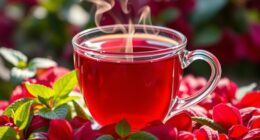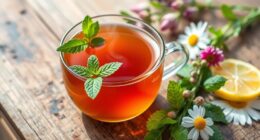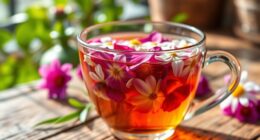Are you tired of feeling bloated and sluggish? Do you desire a natural and gentle method to detoxify your body? Then consider the amazing benefits of herbal teas! For centuries, these beverages have been utilized to support healthy digestion and remove excess fluids from the body.
In fact, some herbal teas are so effective at flushing out toxins that they can make you feel like you’re floating on air! If you’re wondering which herbal tea is a diuretic, I’m here to guide you through the options.
From the vibrant and cleansing Dandelion Tea to the refreshing and rejuvenating Green Tea, there are several choices that can help you achieve a healthy fluid balance. So, let’s dive into the world of herbal teas and discover the perfect diuretic brew for you!
Key Takeaways
- Dandelion tea is a natural diuretic that promotes increased urine production and flushes out toxins.
- Nettle tea promotes healthy fluid balance and helps eliminate excess water weight.
- Parsley tea is a natural diuretic that reduces bloating and flushes out excess fluids.
- Hibiscus tea has diuretic properties and can help lower blood pressure and reduce cholesterol levels.
Understanding Diuretic Properties
Did you know that certain herbal teas, like dandelion or nettle tea, can help promote diuresis and support healthy fluid balance in the body? These herbal teas have diuretic effects, meaning they increase urine production and help eliminate excess fluid from the body.
This can be beneficial for individuals who struggle with water retention or edema. In addition to their diuretic properties, herbal teas like dandelion and nettle also offer a range of other health benefits. They’re rich in antioxidants, which can help reduce inflammation and protect against oxidative stress.
Moreover, these teas can support liver function and aid in digestion. Now, let’s delve into the specific benefits of dandelion tea and how it can contribute to overall wellness.
Dandelion Tea
Imagine a cup of this golden elixir whisking away the excess water from your body, leaving you feeling light and refreshed – dandelion tea has that magical touch. This herbal tea not only delights the senses with its earthy flavor, but it also offers numerous benefits for your health. Here are three reasons why dandelion tea is a diuretic worth considering:
-
Natural diuretic properties: Dandelion tea acts as a gentle diuretic, promoting increased urine production and flushing out toxins from the body.
-
Kidney support: This tea has been traditionally used to support kidney health, as it may help prevent the formation of kidney stones and assist in detoxification.
-
Anti-inflammatory effects: Dandelion tea contains powerful antioxidants that can help reduce inflammation in the body, benefiting conditions like arthritis and digestive disorders.
While dandelion tea is generally safe for most people, it may cause mild side effects such as an upset stomach or allergic reactions in some individuals.
Now, let’s transition into exploring the diuretic properties of green tea.
Green Tea
Get ready to sip on this invigorating elixir that not only tantalizes your taste buds but also offers a plethora of health benefits – green tea. Known for its rich antioxidants and natural compounds, green tea has been consumed for centuries due to its numerous health advantages.
One of the key benefits of green tea is its potential role in weight loss. Studies have shown that the catechins found in green tea can help boost metabolism and fat oxidation, aiding in the process of shedding those extra pounds.
Additionally, green tea has been linked to improved brain function, reduced risk of heart disease, and even protection against certain types of cancer.
As we explore the benefits of green tea, let’s now delve into the next herbal tea that has diuretic properties – nettle tea.
Nettle Tea
Prepare to indulge in the refreshing and invigorating benefits of nettle tea, as it works wonders for your body by promoting healthy fluid balance and assisting in the elimination of excess water weight. This herbal infusion is packed with nutrients, including vitamins A, C, and K, as well as iron, magnesium, and calcium.
Nettle tea boosts energy levels, helping you stay focused and alert throughout the day. Its anti-inflammatory properties can relieve joint pain and alleviate allergy symptoms.
On the other hand, it’s important to be aware of potential side effects, such as an upset stomach or skin irritation. It’s always best to consult with a healthcare professional before incorporating nettle tea into your routine.
Now, let’s transition into the next section about ‘parsley tea’ and discover its unique properties.
Parsley Tea
To fully appreciate the benefits of parsley tea, you’ll love how it adds a burst of freshness to your daily routine. Parsley tea isn’t just delicious but also has numerous health benefits.
It’s known to be a natural diuretic, helping to flush out excess fluids from the body and reduce bloating. This can be especially helpful for those who struggle with water retention.
Additionally, parsley tea is rich in antioxidants and vitamins, such as vitamin C and vitamin K. These nutrients can support immune function and promote overall well-being.
However, it’s important to note that parsley tea may have potential side effects, such as allergic reactions or interactions with certain medications. As always, it’s advisable to consult with a healthcare professional before incorporating any new herbal tea into your routine.
Speaking of herbal teas, let’s now explore the wonderful benefits of hibiscus tea.
Hibiscus Tea
Feeling parched? Try sipping on a cup of hibiscus tea and let the tangy flavor transport you to a tropical paradise. Hibiscus tea is not only refreshing, but it also offers a range of benefits. Rich in antioxidants, hibiscus tea can help lower blood pressure and reduce cholesterol levels. It is also known to have diuretic properties, promoting healthy kidney function and flushing out toxins from the body. To make hibiscus tea, simply steep dried hibiscus flowers in hot water for about 5-10 minutes. You can add a touch of honey or lemon for extra flavor. With its vibrant color and numerous health benefits, hibiscus tea is a delightful addition to your herbal tea collection. In the next section, we will explore how to choose the right herbal tea for your needs.
Choosing the Right Herbal Tea
After exploring the benefits of hibiscus tea, I’m now excited to delve into the world of choosing the right herbal tea. As someone who values natural remedies and the power of plants, finding the perfect herbal tea blend is essential.
There are countless options available, each with its own unique properties and potential health benefits. From calming chamomile to invigorating peppermint, herbal teas offer a variety of flavors and therapeutic effects. Some popular options include ginger, turmeric, green tea, and lavender.
Each type of herbal tea has its own set of properties that can support overall well-being. Whether you’re looking to boost your immune system, improve digestion, or promote relaxation, there’s a herbal tea out there for you.
So, let’s dive in and explore the world of herbal tea together!
Frequently Asked Questions
Can diuretic herbal teas be harmful if consumed in excess?
Yes, diuretic herbal teas can be harmful if consumed in excess. While they have potential benefits for kidney health and managing high blood pressure, moderation is key to avoid dehydration and electrolyte imbalances.
Are there any side effects of drinking diuretic herbal teas?
Drinking diuretic herbal teas can have potential risks if consumed in excess. It’s important to stick to the recommended dosage. I once drank too much dandelion tea and felt like a waterfall, proving the power of these teas!
Can diuretic herbal teas help with weight loss?
Diuretic herbal teas can be a helpful addition to a weight loss regimen when combined with exercise. While they may promote temporary weight loss due to water loss, long-term effectiveness for weight loss is limited.
How long does it take for diuretic herbal teas to start working?
When it comes to diuretic herbal teas, it’s important to choose the right one for your needs. Incorporating these teas into your daily routine can have numerous benefits, such as promoting natural detoxification and supporting urinary health. The time it takes for diuretic herbal teas to start working can vary, but you may begin to notice their effects within a few hours.
Can diuretic herbal teas interact with medications?
Diuretic herbal teas can potentially interact with blood pressure medications, affecting their effectiveness. It’s important to consult with a healthcare professional to ensure there are no negative effects on kidney function.
Conclusion
In conclusion, after researching various herbal teas, it’s evident that some possess diuretic properties. Dandelion tea, with its ability to promote urine production, can be a beneficial choice. Green tea, nettle tea, and parsley tea also have diuretic effects, helping to flush out excess fluids from the body. Hibiscus tea, while not a strong diuretic, offers other health benefits. It’s important to choose the right herbal tea that suits your needs and preferences. Remember, finding the perfect herbal tea is like finding a needle in a haystack, but once you do, it can work wonders for your overall well-being.










